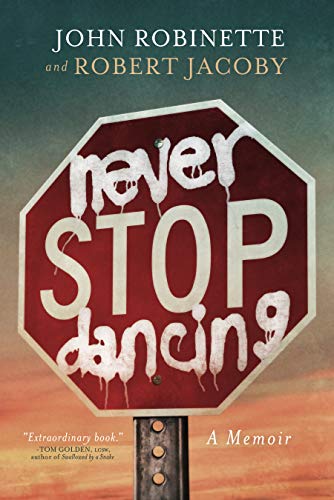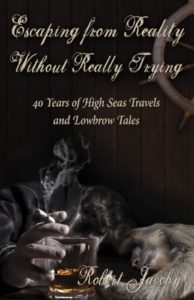
Never Stop Dancing: A Memoir received a 4+ star review, making it an IndieReader Approved title.
Following find an interview with authors John Robinette + Robert Jacoby.
What is the name of the book and when was it published?
Never Stop Dancing: A Memoir, published October 10, 2019.
What’s the book’s first line?
It was late July 2010, and I was racing against a closing window of time. The line is from Robert’s Introduction to the book.
What’s the book about? Give us the “pitch”.
In the spirit of the classic Tuesdays with Morrie with the immediacy and pathos of the recent bestseller Two Kisses for Maddy, Never Stop Dancing is a poignant meditation on the power of love and loss—and the equally vital power of resilience.
In the spring of 2010, John Robinette’s wife, Amy Polk, was killed in an accident on the streets of Washington, DC, leaving him alone to raise their two young sons. His world was shattered, and his friend, author Robert Jacoby, was shattered seeing him grieve. Robert was at a loss as to what he could possibly do—what anyone could do—to help John in his miserable situation. Then the thought came: Just be with John; talk with him; listen to him. Robert proposed an unusual idea: he would interview John over the course of the first year after Amy’s death. The hope was to meet John directly in his experience of sorrow, explore his grief with him, and discover what lessons might be learned.
Now, nine years later, a book is born of those candid conversations. Never Stop Dancing avoids clichéd takeaways about grief and healing to chart a deeper, thornier examination of loss and regret. Robert and John were transformed through their shared experience and emerged strengthened with an abiding male friendship that cuts against the grain of pop-culture trends of quick fixes and easy answers.
What inspired you to write the book? A particular person? An event?
Oh, yes, there was a particular event. See our reply to the question above.
In addition, Robert has journalism experience in his career background, and by 2010 he had already written his first book, Escaping from Reality Without Really Trying, which was based on a series of long interviews with a merchant seaman. With that in his background, Robert asked John to sit for a series of interviews over the first year after Amy’s death.
What’s the main reason someone should really read this book?
John: The human act of sharing our experiences of grief with one another can mediate grief’s crippling power over us and help us take the next step forward with life. As our conversations unfold in the book, I hope the reader can be reminded of the power that community, friendship, and love have in the face of what might seem like hopelessness.
Robert: For connection, and hope. I’ll quote from my Introduction to the book: “Through the conversations that make up Never Stop Dancing I was reminded that I am not alone in this; this is life. But in this life of pain and sorrow there is great joy and beauty, too. And there are gifts to be found in grief. I wanted to know what could be salvaged, what might be learned, and after, what new life might be found and enjoyed.”
If they made your book into a movie, who would you like to see play the main character(s)?
John: For Robert, I’d cast Jake Gyllenhaal or Casey Affleck.
Robert: Ben Affleck or Ryan Gosling for John.
When did you first decide to become an author?
Robert: When I was a teenager I was beginning to feel the pangs of some things I wanted to say to the world.
Is this the first book you’ve written?
John: Yes.
Robert: No. I have three other books out: Dusk and Ember (2019), a novel; There Are Reasons Noah Packed No Clothes (2012), a novel; and Escaping from Reality Without Really Trying: 40 Years of High Seas Travels and Lowbrow Tales (2011), nonfiction. I have another novel that’s finished, and I’m seeking representation for it, and I’m also working on a fourth novel.
What do you do for work when you’re not writing?
John: I am an Organizational Development consultant and Leadership Coach at the University of Maryland. I am also involved in a start-up, V-Teamwork.com, in which we are using online, immersive gaming to develop team cohesiveness, improve communications, and achieve high levels of performance.
Robert: I write full time now. My most recent gig was in a consultancy as a web governance expert for the Food and Agriculture Organization of the United Nations in Rome, Italy.
How much time do you generally spend on your writing?
John: Anywhere from 15 minutes to a couple hours spread across journaling, blogging, social media, and technical content writing.
Robert: I’m currently immersed in work on a new novel. I’ll work a few hours on it every day, from 6 or 7 a.m. to when I’m done, typically around mid-morning. Sometimes I’ll work afternoons, depending on the type of work it is. Weekends are usually for rest.
Would you go traditional if a publisher came calling? If so, why?
We both would consider a traditional publisher, but it would have to be the right publisher for our work. We have some ideas for additional books following Never Stop Dancing, so we’ll have to see how this all plays out.
Is there something in particular that motivates you (fame? fortune?)
John: Often it’s simply some thought burrowed in that I need to let out. Journaling is my go to for this. Sometimes it’s something simple, or even humorous, to me at least, and it turns into a social media posting. Sometimes it’s something more and starts turning into a blog post. It’s less expensive than therapy.
Robert: I’m wary about fame and fortune, because both have been the ruin of many a fine writer. I write to write, because it’s who I am. If readership follows, that’s great.
Which writer, living or dead, do you most admire?
John: Most admire is hard to say, but E. B. White is who first came to mind. I love his wit; the precision of his words. In a prior life, when I was a director for a software engineering team, I bought copies of Elements of Style for my managers. I told them that they actually write for a living: emails, memos, proposals, and so on, and they had better get it right to be effective.
Robert: Cormac McCarthy. No one writes like him. Blood Meridian is the finest novel that I have ever read in the English language, and it is among the finest works of literature ever written, I think. No Country for Old Men and The Road are among the best novels written in the past 50 years.
Which book do you wish you could have written?
John: The next book I’m trying to write.

